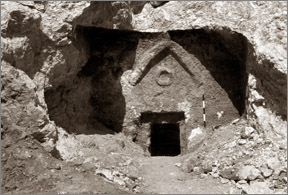Last resting place of Jesus ?
If it really were the most important archaeological discovery in
history, the point of truth came with very little song or dance. There
was no drum roll or fanfare, just the sweeping aside of black felt
drapes to reveal a pair of simple stone boxes sitting side by side.
|

In this undated photo released by Vision TV , Monday, Feb. 26,
2007,the entrance to a burial cave in southern Jerusalem is seen.
-AP |
But for the panel of film-makers, theologians and statisticians at
New York's public library yesterday, this really was the moment. As
James Cameron, the director of the film Titanic who has lent his name to
the project, said: "It doesn't get bigger than this".
The claim that was being presented to the world's media and which
will be aired on the Discovery Channel on Sunday was that the two boxes
once contained the bones of Jesus of Nazareth and his wife Mary
Magdalene. Another box, not present at yesterday's event but
coincidentally on display in Fort Lauderdale, Florida, contained, so the
theory goes, the bones of their son, Judah.
The boxes, which housed human bones and are known as ossuaries, are
made out of Jerusalem limestone with its distinctive colour of clotted
cream. The smaller of the two bears the inscription Jesus, son of
Joseph, while the larger and more lavishly decorated is marked in the
name of Mariamene e Mara.
According to the Canadian documentary-maker, Simcha Jacobovici, the
inscription translates as Mary Magdalene the Master. It is his
contention that he and his team of advisers have conclusively found the
tomb of Jesus and his family.
"This is somewhat surreal," Mr Jacobovici said as the drapes were
pulled back. "To think that maybe under that felt are the ossuaries of
Jesus of Nazareth and Mary Magdalene which lay together side by side for
2,000 years."
The claim that Jesus was married to his disciple Mary Magdalene, that
they had a child together in the style of the Da Vinci code, and that
after his death he left behind his bones rather than being resurrected
in the flesh elicited an outcry that was as instant as it was
predictable.
The American-based Catholic League dubbed the theory a "Titanic
fraud", saying that not a Lenten season goes by without some author or
TV programme seeking to cast doubt on the divinity.
Amos Kloner, a top Israeli archaeologist who was one of the first to
examine the ossuaries when they were discovered, said: "We have no
scientific proof that this is indeed the tomb of Jesus and his family
members".
At the centre of the controversy is an undisputed fact: that 10
ossuaries dating from the first century were found in the Talpiot suburb
of Jerusalem in 1980 by building workers. A common funeral practice at
that time was to leave the bodies of the deceased to decay for up to a
year until only their bones were left, then pack them in the stone boxes
and entomb them.
Of the 10 ossuaries found, six had inscriptions bearing the names of
Jesus, Mary Magdalene, another Mary who the film-makers deem to be
Jesus's mother, Matthew and Yose who they say were two of his four
brothers, and son Judah. The existence of the boxes and the precise
inscriptions they bore are matters of consensus, though how to interpret
them certainly is not.
Mr Jacobovici, with the support the Oscar-winning Mr Cameron, who
acted as executive producer, says the initial discovery of the ossuaries
failed to excite much interest in 1980 because archaeologists were not
armed at that time with the knowledge and scientific tools that now
exist. His theory relies on the recent retranslation by experts of the
Mariamene as Mary Magdalene.
The team carried out DNA sampling on matter remaining in the two
boxes and claim it supports the contention that Jesus and Mary Magdalene
were man and wife. And they turned to statistical advice from a
professor in Toronto who concluded on the basis of the six names etched
into the ossuaries that the possibility of this being the Jesus family
tomb should be "taken very seriously indeed", putting the probability
that the tomb housed an entirely different family at 600-1.
But even as the felt was being pulled back yesterday, holes in the
theory were becoming glaringly evident. The DNA available to
investigators is very limited as the bones themselves have long since
been reburied.
The test carried out by the film-makers was mitochondrial - that is
it only contained information on maternal inheritance, thus allowing the
possibility that Jesus and Mariamene were brother and sister through the
paternal line.
Israeli archaeologists were also quick to point out that despite the
statistical work commissioned by Mr Jacobovici, the names scratched into
the boxes were all highly popular and common in the first century.
"We know that Joseph, Jesus and Mariamene were all among the most
common names of the period. To start with all these names being together
in a single tomb and leap from there to say this is the tomb of Jesus is
a little far-fetched, to put it politely," said David Mevorah, a curator
of the Israel museum in Jerusalem.
Professor Kloner told the Yedioth Ahronoth newspaper that the name
Jesus had been found 71 times in burial caves at around that time.
The documentary, The Lost Tomb of Jesus, airs on the Discovery
Channel on tonight at 9pm.
Guardian Unlimited
|
